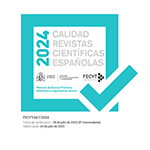Childhoods, family and schooling in Engabao: School ethnography in a fisher village in Ecuador
Abstract
Throughout an ethnographic method, this paper explores the ways children and teenagers in the fisher’s tows of Engabao, Ecuador, live their age and family experience, in a culturally different way from the norms that occidental models impose, and how this affects their schooling. The research problematizes the concept of “universal childhood”, and explores the anthropological and sociological models that help to interpret those childhoods that work, date and reproduce at an early age, and circulate among households. The participant observation was the main method, with the support of different tools such as the diary field and structured and non-structured interviews; the second ones in formal groups, and the first ones in an individual way and in informal groups. In the other hand, there is the bibliographical research. The concept of child agency is the main theoretical support, in order to interpret the activity of children and teenagers as social agents, who are empowered to take decisions and transform the world they inhabit.
Downloads
Article download
License
In order to support the global exchange of knowledge, the journal Sociedad e Infancias is allowing unrestricted access to its content as from its publication in this electronic edition, and as such it is an open-access journal. The originals published in this journal are the property of the Complutense University of Madrid and any reproduction thereof in full or in part must cite the source. All content is distributed under a Creative Commons Attribution 4.0 use and distribution licence (CC BY 4.0). This circumstance must be expressly stated in these terms where necessary. You can view the summary and the complete legal text of the licence.










